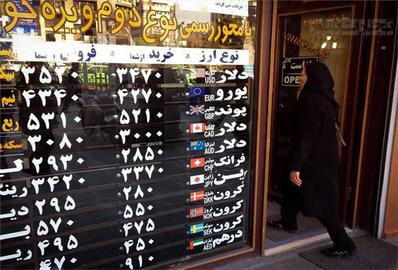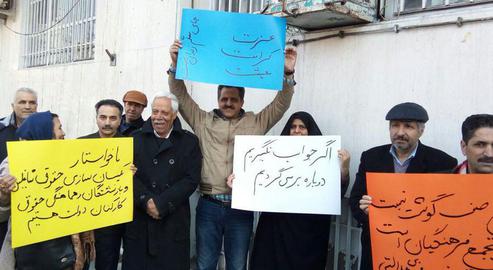This story of human trafficking begins in Tehran and nearby Karaj, at two currency exchange stores, one in the Shemiaranat are of Tehran and the other in Karaj Square, where people hoping to get to Europe seek out help. But for many of them, it is a treacherous journey during which anything can happen — from being robbed to being abandoned in harsh climates far from home. Some of these refugees have such a harrowing experience that they choose to return to Iran after months or even years of trying to make their way to another country.
Travel agencies and other businesses have referred people to the two stores for years. The people running the shops have links to human traffickers who work primarily in the Balkans. Some of these traffickers are related to the shop owner, Sardasht, and his daughter married to one of Turkey’s most infamous traffickers a few years ago.
This is how most Iranian traffickers operate. Wherever they are, whether it is inside or outside of the country, they introduce their clients to official currency exchange businesses to gain their trust. The store clerk gives them a “code,” which should be kept secret. When the traveler reaches his or her destination, he or she calls the exchange store, provides the code and then the money — the amount depends on the destination — will be transferred to the trafficker. But there are many instances of traffickers kidnapping people, and forcing them to make the call and release the money. When the money is wired, these people often disappear.
The Road to Serbia
The most powerful and infamous leaders of this particular exchange shop trafficking gang are believed to be located in Turkey. The gang is made up of Iranians, Turks and Kurds. Sardasht is one of them. After people leaving Iran reach Turkey, they call Sardasht, who arranges the next step of the trip and puts them in touch with the next link on the human trafficking chain, usually a trafficker based in Serbia, Bosnia, Croatia, or Slovenia.
The gang’s clients are usually journalists, or political and human rights activists, but also just ordinary citizens. IranWire has spoken to many of these people, the majority of which asked to remain anonymous. I spoke to an activist faced with criminal prosecution who decided to leave the country. As with others, a travel agency introduced him to the exchange store in Tehran. The owner, in coordination with Sardasht, provided the activist with a fake passport since he had been banned from leaving the country. The passport contained his photo but somebody else’s information. I had heard many times how expert Iranian traffickers are at forging documents — so much so that they are known for it within the trafficking community.
According to political refugees who had used this gang’s service, when Iranians did not need to get a visa to go to Serbia, traffickers would send people to the airport either with both a fake and their real passport, or sometimes only the fake one. They bribed the airport officers to stamp the fake passport and passengers could then board the plane and go to Serbia. But now that a visa is required, travelers have to through Turkey, Greece and Macedonia to get to Serbia.
In Serbia, another team then waits for the clients. They are initially housed in shelters and are then sent by car to Bosnia. Some people get caught along the way — and in some cases, people have lost their lives. Many people staying in the refugee camps in Bosnia have tried to get to other parts of Europe but returned to the Bosnian camps when they fail. The camps are always overpopulated and in some cases are only made up of tents in the woods near the border with Croatia. Most of the traffickers in this area are connected to Haji Ziad, the uncle of another Iranian trafficker. His nickname is Tork, which means “expert” in Bosnian. He employs Iranian and Afghan traffickers. They send clients by taxi to Croatia and then to Italy for about 5,500 euros. If they pay less, they walk more, sometimes even for 10 days in a row.
Mountains, Woodland — and Land Mines
This path is a very dangerous one, traversing through mountains and woodland going across steep hills and valleys, and even worse, land mines. People I spoke to who had made it across that route told me they saw many corpses along the way, some of them torn apart by wild animals. No one knew about the identity of these people. Others simply disappeared, and their bodies have never been found.
Haji Ziad owns shelters in Croatia, and travelers on their way from Bosnia to Zagreb stay with him. A man named Abu Mohammad rents cars to travelers and traffickers alike. He works with the currency exchange stores and gets paid to send clients by car to Zagreb. Haji Ziad then sends people on their way to Italy.
Whether they reach their destination or not depends on luck. Many of the gang's clients IranWire spoke to said the gang had left them alone in the woods in Croatia and, after spending days with no food or water they felt they had no option but to surrender themselves to the police, and some of them even went back to Iran. One of them said: “If you can expose and catch Sardasht, half of the human trafficking operation will disappear.”
Some told me about people being kidnapped by traffickers while staying at their houses, including at Abu Mohammad’s house. He was one of the people who had forced refugees to call the currency exchange stores to release money.
This particular gang has been in business for many years. But although I heard shocking, tragic stories, many political and human rights activists or journalists have reached Europe using the services of this gang. Apart from the risks involved, many of these individuals endure even further hardship because they are often charged a higher price just because they are activists or have fled Iran because of their work as journalists. After losing money or being forced to pay huge amounts, some of these refugees decide not to use the gang and make the journey on their own. But this is increasingly difficult since the gang is so well-connected and knows the best way to organize the journeys. One of these political refugees told IranWire that he spent a whole night in the woods after he broke his ankle falling off a cliff.
For the safety and security of witnesses and affected refugees, we used pseudonyms for the gang members discussed in this report
Aida Ghajar’s series on human trafficking continues. In the coming weeks she hopes to speak directly with more Iranian asylum seekers and with people who have firsthand knowledge of human trafficking. If you have a story to tell, please get in touch.
visit the accountability section
In this section of Iran Wire, you can contact the officials and launch your campaign for various problems

























comments